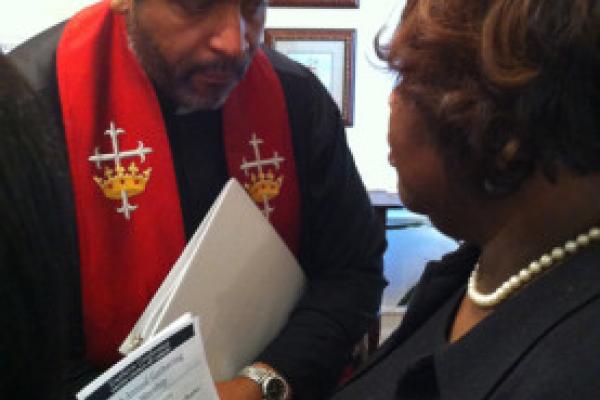Recently, I marched with McDonald’s workers from three dozen cities to the company’s corporate headquarters outside of Chicago. After they refused to leave the corporate campus of the fast-food giant with its $5.6 billion in profits last year, 101 workers were arrested.
I knew I had to come when the workers invited me to share some of the lessons we have been learning in North Carolina about civil disobedience — and moral support.
I watched my new friends sit down. I watched the police gather. I prayed with the McDonald’s workers as the police looked on and then slapped plastic handcuffs on more than 100 of the workers and arrested them.
I could not help but think of the historic arc of the civil rights movement. For all the gains we have been making, the treatment of low-paid workers by some of the most profitable corporations in the world ranks high in the more significant causes of the growing inequalities in the U.S.
I have helped lead the fight against backward laws passed by an extremist group of legislators that, three years ago, took power in North Carolina. Last year, national media discovered us, calling us the Moral Monday protesters. In fact we have been organizing and protesting for eight years. The fight for living wages and the right to collectively bargain for all workers are key parts of the 14-point agenda we developed in 2006 along with dozens of progressive partner organizations. We know money in the hands of low-wage workers lifts our economy.
But helping workers collectively fight for better wages is central to our movement and the right thing to do. All great religions instruct their followers on how employers should treat their workers. Living wages are at the center of our deepest moral and faith traditions.
Consider Deuteronomy 24:14: “You shall not oppress a hired servant who is poor and needy, whether he is one of your brothers or one of the sojourners who are in your land within your towns. You shall give him his wages on the same day, before the sun sets (for he is poor and counts on it), lest he cry against you to the Lord, and you be guilty of sin.”
Or Jeremiah 22:13: “Woe to him who builds his house by unrighteousness, and his upper rooms by injustice, who makes his neighbor serve him for nothing and does not give him his wages.”
As I travel the country, I see more and more evidence that we are on the threshold of the Third Reconstruction Movement. The First Reconstruction, built by a multiracial Southern Fusion movement in the wake of the Civil War, was crushed when the nation legalized segregation and two-tier employment, housing, education and health system. Jim Crow laws were driven deep into the Southern economic and political system, setting back the human race in the struggle to repair the breach caused by racism.
The Second Reconstruction can be traced to that glorious day in 1954 when nine white men in black robes said no to Jim Crow. Over the next 14 years, young and old, white and black, rich and poor risked their lives, their fortunes and their sacred honor to repair the breach. In 1968, with the murder of the Rev. Martin Luther King Jr., the destruction of the organizational infrastructure of the Southern freedom movement, and a clever propaganda campaign relying on thinly disguised racist appeals to white Southern voters, extremists betrayed President Lincoln’s vision and his party. They turned their back on people of color. And they have become willing accomplices to a 40-year effort to dismantle the gains of the Second Reconstruction.
You cannot see injustice and say nothing. You cannot see exploitation and say nothing. You cannot see systematic poverty and say nothing. You cannot see one human being abuse another human being, God’s creation, and say nothing. At every time, in every age, we need dissenters, who speak out about injustice.
In North Carolina, we say “Forward Together, Not One Step Back.” We salute the McDonald’s workers. They are in the front ranks of the Third Reconstruction — the fight of our time.
The Rev. William J. Barber II is the president of the North Carolina NAACP. Via RNS.
Got something to say about what you're reading? We value your feedback!
